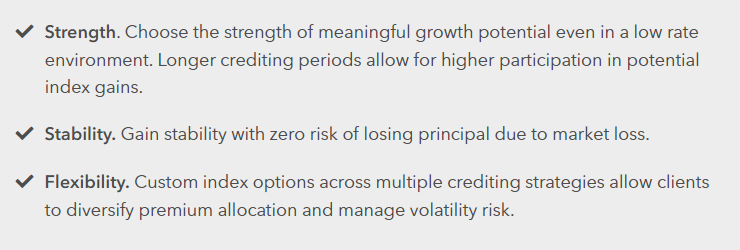What Is An Annuity?
Annuities 101
Your Retirement Checklist
Before you start your next big chapter of retirement, help make sure you’re financially on track for the golden years you want. Like many important to do’s, breaking them down into a checklist can make the exercise much easier to tackle. Plus, your sense of accomplishment from checking off each task can encourage you to stick to your mission. Here’s a 6‑step checklist to help get the ball rolling on retirement planning and determining what kind of budget you will need in the future.
By taking steps to gain a deeper understanding of your finances, identifying your sources of retirement income and thinking about the life of your future self, you can create a strategy that helps checks all the boxes toward gaining the financial security you seek in retirement.
- Make a retirement budget: "Use these next few months to get a handle on your spending needs and wants so you can be prepared for the day the paychecks stop," says Dan White, firm founder and asset protection consultant of Dan White and Associates in an interview conducted by Athene. "Keep in mind the budget you create today won't be set in stone, as most people have a U‑shaped financial retirement. That means they spend more in the earlier years, less in the middle years when the routine is in place, and more again in later years when health issues drive expenses back up."
- Calculate your Social Security benefit: To look at your earnings and get an estimate of what you'll get from Social Security, you can create a login at ssa.gov/myaccount. If you're not sure when to start taking your benefits, you can also use the Social Security Administration's Quick Calculator to determine how your benefit will change depending on how old you are when you sign up. It's an important part of your retirement equation since the dollar amount can drop by about 30 percent if you take it before you reach full retirement age.
- Calculate your pension payment: If you have a pension, you can talk to your human resources department or pension benefit manager to get an idea of what your monthly payout will be. If you're married, also ask if the pension provides a survivor benefit, and if your regular payment will be cut to provide that benefit.
- Balance your portfolio
If you're about to retire, your investments should likely be taking on a more defensive position, which means that they carry less risk. That way, you'll help protect your savings against any potential market downturns.
- Reset your insurance: Review your insurance contracts which may include; homeowners insurance, life insurance, long-term care insurance, and car insurance to make sure you have the right level of coverage. If you need to cut expenses in retirement, you can raise the deductibles on certain policies. Review your options for health insurance too. Options to consider if you're too young for Medicare are: going on your spouse's policy, buying COBRA from your employer, taking advantage of a pension plan's health benefit, or buying individual insurance on your state's exchange or on healthcare.gov.
- Determine where you'll live: "Where you live, especially if you will still have a mortgage, is an important part of the retirement puzzle," says White. If your dream is to relocate, he suggests possibly renting in a location to see if you really like it first. Your plans should also address where you will live while you age. Will you want to age in your current location? What costs will be associated with that kind of care? Or will you move to a 55‑and‑up community? What about assisted living? These should all be factors in your future retirement budget.
By taking steps to gain a deeper understanding of your finances, identifying your sources of retirement income and thinking about the life of your future self, you can create a strategy that helps checks all the boxes toward gaining the financial security you seek in retirement.






